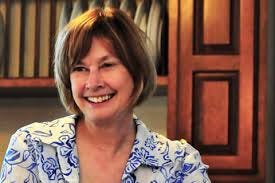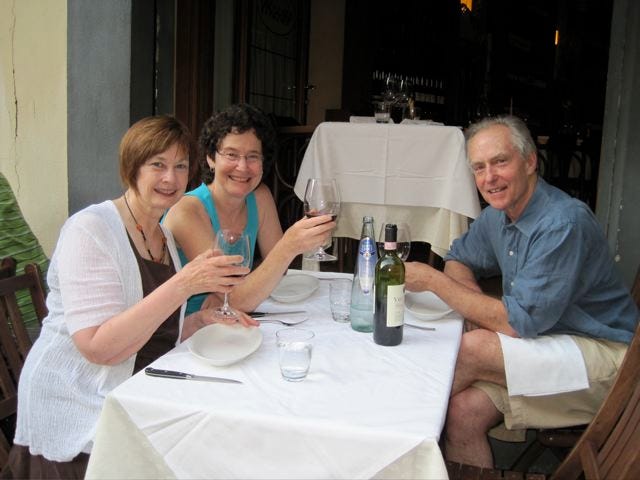I’m writing a thank-you letter here.
You may know Sena Jeter Naslund from her books, especially Ahab’s Wife. She’s written nine. I know her in a different capacity. As the leader, guide and inspiration of the Master of Fine Arts in writing program at Spalding University in Louisville, Kentucky where I taught.
I taught at Spalding, under her careful eye and guidance, for nine years, from 2003 to 2012. It’s no stretch to say that she rescued me. I was living in New York City, struggling to stay afloat. My first book had been reissued, and I got some mileage out of that, including an invitation to the South Carolina Book Festival. That’s where I met Sena. An old friend, who taught at Spalding, introduced me to her there. He had raved about Sena and the program for years.
I returned to New York and wrote Sena asking her if she would consider hiring me to teach at Spalding. It’s a low-residency program, meaning that students come to Louisville twice a year for workshops and the rest of the year send their writing to their teachers for critiquing. I sent her a copy of my book. Luckily for me, she said yes. I was thrilled. In the fall, I went to Louisville for the first time.
That’s where I got to know Sena up close and personal. To see how she ran the MFA program, but, more important, to experience an atmosphere for writing and learning she had created unlike I'd ever experienced before or since.
Her presence—when I was there, at least, because she has since retired, is very much with us, and continues to write—was felt in every corner, every room, in every decision, in every goal of the program. She handpicked each teacher, most of whom she knew personally and many of whom she had taught at an MFA program in Vermont.
She told me once that she could never hire anyone whose work she didn’t like. Every teacher that I knew spoke of her as if their friendship was a kind of betrothal. These relationships were deeply personal and proprietary. I always got the feeling that teachers felt that Sena was theirs alone. Their bonds were fast.
What she did was to create an atmosphere of non-competitiveness and unity of purpose I have never seen in any of the colleges and universities where I’ve taught writing. She’d encountered the opposite in her own teaching career and was determined that would never be the way in her program. It wasn’t. There was a sanctity that she created by her force of will and, yes, aura.
“Welcome home!” she said, beginning each residency. And another perennial opening, “Your competition isn’t in this room.” Meaning the auditorium where we all gathered. “It’s in the library.” You can get an idea of her Alabama-born, bell-like voice here in several interviews I’ve never heard a voice as commanding with less aggression.
For two weeks each year, in the fall and spring, students and teachers would live and work in a foreign country where everyone spoke the same language. Foreign, because this country of Spalding existed nowhere else.
This was a place and time, for example, where you could stop a student or fellow teacher on the way to a workshop and ask them their opinion about semicolons—and off you went. Where you were fellow citizens in the realm of sentences, dialogue, characters, story. Where your tentative desire to write was openly encouraged. There was never any doubt that you belonged there. That was her doing.
Sena was there, everywhere. Faculty read from their work each evening, and the readings went late sometimes. By then, everyone was thoroughly depleted from a long, overflowing day—especially at the end of the week. But there Sena would be, sitting in the audience, attentive and engaged while others, like me, were nodding off or leaving early for the comfort of our hotel rooms. She closed the place each night. She was dedicated, and we wanted to follow her example.
She gave everyone a kind of open permission to be themselves, to be the self in their heart of hearts. I felt each time I came to Louisville as if I’d been given a transfusion. A shot of purpose, an infusion of art. We were all exhausted at the end of the residency. We were spent. But we carried a fierce inspiration home with us that sustained us for weeks.
No writer is asked to do what they do. They’re doing something that for many, still, has no tangible purpose and does not fit in with traditional ideas of work. Sena and her program reassured you that it was not just acceptable but inevitable that you write.
I left Spalding in 2012. I took a job teaching at the University of New Orleans in their MFA program. Sena did not allow you to teach at Spalding and for a competing MFA program at the same time. Reasonable, but it was a sad day for me when I realized I would not be going back. But I, as have so many others, experienced those years in a foreign country where everyone speaks the same language. I still do.







Such a lovely, heartfelt piece. I'm actually leaving for Louisville today, Richard to attend the last couple of days of residency and see alumni. It is a special place because of the special community and people and, as you wisely said, that atmosphere was created and nurtured by Sena. I am so glad that you were/are a part and that, because of the program, we got to be friends. Thank you for this lovely letter and tribute.
Yes, yes, and yes. Thank you, Richard. And I was/am honored to see that photo of you and me and Sena. I think we were in Rome for that, perhaps?